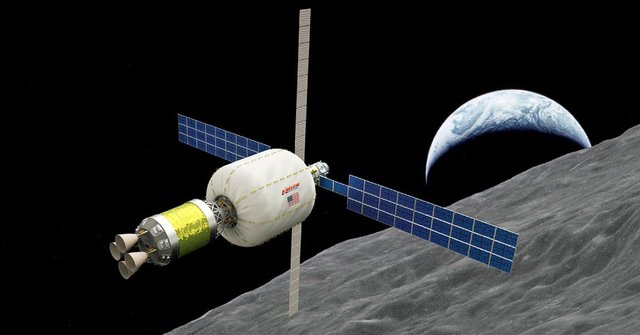Bigelow Aerospace’s new company will find customers for its space habitats
Bigelow Aerospace — the Las Vegas-based company manufacturing space habitats — is starting a spinoff venture aimed at managing any modules that the company deploys into space. Called Bigelow Space Operations (BSO), the new company will be responsible for selling Bigelow’s habitats to customers, such as NASA, foreign countries, and other private companies. But first, BSO will try to figure out what kind of business exists exactly in lower Earth orbit, the area of space where the ISS currently resides.
Bigelow makes habitats designed to expand. The densely packed modules launch on a rocket and then inflate once in space, providing more overall volume for astronauts to roam around. The company already has one of its prototype habitats in orbit right now: the Bigelow Expandable Activity Module, or BEAM, which has been attached to the International Space Station since 2016. The BEAM has proven that Bigelow’s expandable habitat technology not only works, but also holds up well against the space environment.
“We’re going to be spending millions of dollars to try to get to that answer.”
Now, Bigelow is focusing on its next space station design: the B330. The habitat is so named since it will have 330 cubic meters (or nearly 12,000 cubic feet) of interior volume when expanded in space. That’s about one-third the volume provided by the ISS. Bigelow hopes to launch two B330s as early as 2021, on top of the United Launch Alliance’s Atlas V rockets, and the company even has plans to put a B330 around the Moon. After that, Bigelow has bigger plans to create a single station with 2.4 times the entire pressurized volume of the ISS, the company announced today. Such a huge station will need to be constructed in an entirely new manufacturing facility that Bigelow plans to build — though the company hasn’t decided on a location yet.
But first, Bigelow wants to understand what the global market is for commercial ventures in lower Earth orbit. BSO will spend this year having face-to-face discussions with corporations, space agencies, and foreign countries to get a sense of who could be the potential costumers for its orbiting stations. “We’re going to be spending millions of dollars to try to get to that answer,” Robert Bigelow, president of Bigelow Aerospace, says during a press call today. He also announced that BSO has already made a deal: it’s partnering with the manager of the US national lab on the ISS, called CASIS, to send payloads to the station.
The B330s offer “on orbit space for science and research at much a lower price than ISS,” Blair Bigelow, the company’s vice president of corporate strategy, wrote in an email to The Verge. The company has also been open about the idea of turning its habitats into hotels, making money off of space tourism. But Bigelow is also interested in “helping foreign countries to establish their human space programs,” the president says, as well as expand into “larger markets that do not fall into the science baskets.” Bigelow, however, did not specify what exactly those markets might be.
“That’s a huge disadvantage.”
If Bigelow can’t find customers, it could choose not to deploy its B330s, the president says. Foreign countries and other ISS partners are currently being courted by China, which plans to build its own space station in lower Earth orbit in the 2020s. That creates tough competition for commercial companies like Bigelow. “They’re offering very attractive terms and conditions and features that the commercial sector is gonna have a horrible time trying to compete with,” Bigelow says. “That’s a huge disadvantage that exists today.”
NASA is also a competitor, Bigelow says. The Trump Administration wants the space agency to focus on sending astronauts back to the Moon with the help of foreign countries. But if space agencies across the globe focus on deep space programs, there might be little money left for doing business in lower Earth orbit, Bigelow says. It’s also unclear what role commercial companies will play in this area of space, come 2025. That’s when direct NASA funding for the International Space Station will end, if President Donald Trump has his way. NASA hopes that commercial space companies could either take over parts of the ISS or put their own smaller stations in orbit, but nothing is etched in stone yet. “I get an uneasy feeling that there is not a plan,” Bigelow says. “There is not something in place to actually embrace all the partners and say, we have a future for you [in lower Earth orbit].”
So Bigelow’s new venture wants to find out what that future looks like. The investigation should be done by December, and then the company will announce its results, saying whether the news is terrible, mediocre, or great, Bigelow says. He adds: “Of course, we’re hoping that it’s going to be great news.”
Update: The story has been updated to include details about BSO’s partnership with CASIS.
I don;t want the world to see me.. I don't think they would understand.
They say risk only comes from not knowing what you are doing.